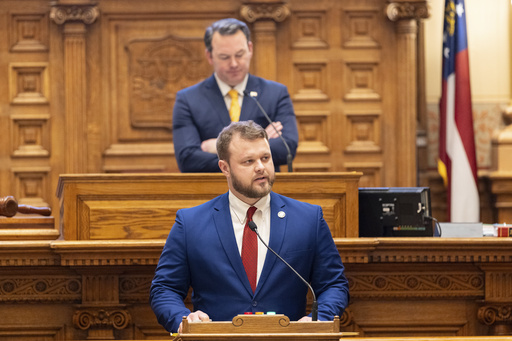
ATLANTA — The Georgia State Senate approved Governor Brian Kemp’s significant legislation aimed at limiting lawsuits, passing with a vote of 33-21 on Friday. Prior to the vote, some Republican senators secured a concession, which helped to gather the necessary support for the bill’s passage.
Senate Bill 68 will now proceed to the House for further discussion as Kemp continues to rally both political backing and lobbying efforts. Meanwhile, another related bill, which aims to restrict third-party funding for lawsuits, has not yet been presented to the complete Senate assembly.
This legislation proposes stricter regulations regarding property owner liability for injuries occurring on their premises and prevents attorneys from receiving double fees for a single case. Furthermore, it allows for separated trials to address liability as well as damages and seeks to enable defendants to have non-meritorious cases dismissed before incurring heavy pretrial costs.
Senate President Pro Tem John Kennedy, a Republican from Macon and sponsor of the bill, described it as a measure to restore balance to the civil justice system and stabilize costs for health care providers, business owners, and Georgia consumers at large. “The cost of inaction is staggering,” Kennedy remarked. “Our system is indeed broken, and it is imperative that we make changes.”
Supporters argue that the proposed changes, termed as tort reform, will benefit businesses, healthcare professionals, and property owners by reducing litigation costs and potentially lowering insurance premiums. In contrast, critics contend that there is no substantial evidence to suggest a drop in insurance costs and express concerns that individuals may be deprived of compensation when wronged.
“This discussion is not about mending a flawed system,” said Senator Nabilah Islam Parkes, a Democrat from Duluth. “It’s about fabricating a crisis to annihilate consumer protections and provide greater authority to large insurance firms.”
An amendment proposed by Islam Parkes aimed at capping insurance rate hikes to the rate of inflation was dismissed by the senators.
A last-minute compromise modified one aspect of the bill regarding how juries assess medical damages. Currently, jurors only review bills presented by healthcare facilities and providers before any negotiations with insurers. Kemp advocated for jurors to see only the actual amounts paid by injured individuals, arguing that considering face value leads to “phantom” damages. Under the new agreement, jurors will review both types of bills and determine appropriate damages themselves.
“What we’ve achieved is a directive to present the jury with the facts,” declared Republican Senator Bo Hatchett from Cornelia. “If the jury wishes to know whether the plaintiff had insurance, reveal that information. Should they inquire about the total bill, let’s show them that as well.”
This compromise was critical in winning the support of Hatchett and other Republican senators who are attorneys, enabling smoother passage of the measure through the Senate. The vote ensued after Cody Hall, a political strategist for Kemp, issued an unusual warning on Thursday, stating that Kemp would provide backing to challengers of any Republicans who opposed or weakened the bill.
“We will ensure that supporters are recognized, while also making sure voters are aware of those who resist his agenda,” Hall warned.
Lobbyists from both sides of the debate are making substantial expenditures as Kemp has suggested that a special session may be considered if his bills fail. Before the Senate cast their votes, clerks circulated numerous letters from business organizations endorsing the bill.
Democrats introduced a counterproposal to portions of Kemp’s legislation, arguing it was excessively stringent. Their alternative would impose limits on the liability of property owners for injuries resulting from crimes occurring on their property and safeguard businesses from being held responsible providing they take security measures. Additionally, it specifies that simply being situated in a high-crime area does not make a property owner liable.

